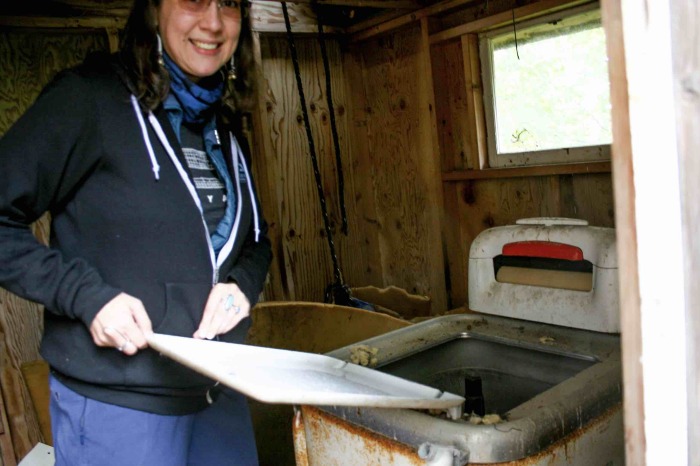Clothes washer — Iqai’isuuteq
Iqai’isuutmen agunanka lliiki.—Put my clothes in the washer.

Photo: April Counceller with the washing machine her family used in Larsen Bay, AM905
The bird and animal skin garments worn by Alutiiq people were not typically washed. People aired out their parkas and left them outdoors to freeze overnight, but they were not scrubbed. In contrast, the fabric clothing introduced by European colonists required regular washing. This was time consuming, never-ending work done by women and their daughters. It meant carrying and heating water, scrubbing fabric, and carrying more water for rinsing.
The Alutiiq word for a clothes washer, iqa’isuuteq, comes from the root iqaq meaning dirt and it specifically means thing for removing dirt. The first mechanical washers appeared in Alutiiq villages in the late 1940s. These machines were enormously valuable to those who had electricity and could afford a washer. They saved hours of labor. Julia Naughton, who was born and raised in Afognak Village, spent an entire summer working at the Port Baily cannery to buy her mother a washer. She was just sixteen and almost all her wages went to paying for the machine, but she was very proud to help her mom.
Laundering clothing and linens was also a source of employment. Alutiiq ladies worked at the joint laundry, dry cleaner, and tailor shop on the Kodiak Naval base. Others had jobs in cannery laundries. In these steamy rooms they washed both cannery laundry and the dirty clothes of fishermen. At some canneries, fishermen could tie up at the dock and drop off their laundry while they took showers. Ladies would sometimes find small gifts in the men’s laundry bags, tokens of appreciation for cleaning their stinky jeans and t-shirts.
The Alutiiq word for a clothes washer, iqa’isuuteq, comes from the root iqaq meaning dirt and it specifically means thing for removing dirt. The first mechanical washers appeared in Alutiiq villages in the late 1940s. These machines were enormously valuable to those who had electricity and could afford a washer. They saved hours of labor. Julia Naughton, who was born and raised in Afognak Village, spent an entire summer working at the Port Baily cannery to buy her mother a washer. She was just sixteen and almost all her wages went to paying for the machine, but she was very proud to help her mom.
Laundering clothing and linens was also a source of employment. Alutiiq ladies worked at the joint laundry, dry cleaner, and tailor shop on the Kodiak Naval base. Others had jobs in cannery laundries. In these steamy rooms they washed both cannery laundry and the dirty clothes of fishermen. At some canneries, fishermen could tie up at the dock and drop off their laundry while they took showers. Ladies would sometimes find small gifts in the men’s laundry bags, tokens of appreciation for cleaning their stinky jeans and t-shirts.
